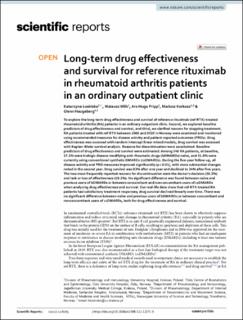| dc.contributor.author | Łosińska, Katarzyna | |
| dc.contributor.author | Wilk, Mateusz | |
| dc.contributor.author | Pripp, Are Hugo | |
| dc.contributor.author | Korkosz, Mariusz | |
| dc.contributor.author | Haugeberg, Glenn | |
| dc.date.accessioned | 2023-02-03T12:18:59Z | |
| dc.date.available | 2023-02-03T12:18:59Z | |
| dc.date.created | 2022-10-20T10:26:09Z | |
| dc.date.issued | 2022 | |
| dc.identifier.citation | Scientific Reports. 2022, 12 (1), . | en_US |
| dc.identifier.issn | 2045-2322 | |
| dc.identifier.uri | https://hdl.handle.net/11250/3048303 | |
| dc.description.abstract | To explore the long-term drug effectiveness and survival of reference rituximab (ref-RTX)-treated rheumatoid arthritis (RA) patients in an ordinary outpatient clinic. Second, we explored baseline predictors of drug effectiveness and survival, and third, we clarified reasons for stopping treatment. RA patients treated with ref-RTX between 2006 and 2020 in Norway were examined and monitored using recommended measures for disease activity and patient-reported outcomes (PROs). Drug effectiveness was assessed with random intercept linear mixed models; drug survival was assessed with Kaplan–Meier survival analysis. Reasons for discontinuation were ascertained. Baseline predictors of drug effectiveness and survival were estimated. Among 246 RA patients, at baseline, 17.1% were biologic disease-modifying anti-rheumatic drugs (bDMARDs) naïve, and 51.6% were currently using conventional synthetic DMARDs (csDMARDs). During the five-year follow-up, all disease activity and PRO measures improved significantly (p < 0.01), with more substantial changes noted in the second year. Drug survival was 83% after one year and declined to 34% after five years. The two most frequently reported reasons for discontinuation were the doctor’s decision (36.2%) and lack or loss of effectiveness (19.2%). No significant difference was found between naïve and previous users of bDMARDs or between concomitant and nonconcomitant users of csDMARDs when analysing drug effectiveness and survival. Our real-life data show that ref-RTX-treated RA patients had satisfactory treatment responses; drug survival declined linearly over time. There was no significant difference between naïve and previous users of bDMARDs or between concomitant and nonconcomitant users of csDMARDs, both for drug effectiveness and survival. | en_US |
| dc.language.iso | eng | en_US |
| dc.publisher | Springer Nature | en_US |
| dc.rights | Navngivelse 4.0 Internasjonal | * |
| dc.rights.uri | http://creativecommons.org/licenses/by/4.0/deed.no | * |
| dc.title | Long-term drug effectiveness and survival for reference rituximab in rheumatoid arthritis patients in an ordinary outpatient clinic | en_US |
| dc.title.alternative | Long-term drug effectiveness and survival for reference rituximab in rheumatoid arthritis patients in an ordinary outpatient clinic | en_US |
| dc.type | Peer reviewed | en_US |
| dc.type | Journal article | en_US |
| dc.description.version | publishedVersion | en_US |
| dc.source.volume | 12 | en_US |
| dc.source.journal | Scientific Reports | en_US |
| dc.source.issue | 1 | en_US |
| dc.identifier.doi | 10.1038/s41598-022-12271-9 | |
| dc.identifier.cristin | 2063124 | |
| cristin.ispublished | true | |
| cristin.fulltext | original | |
| cristin.qualitycode | 1 | |

